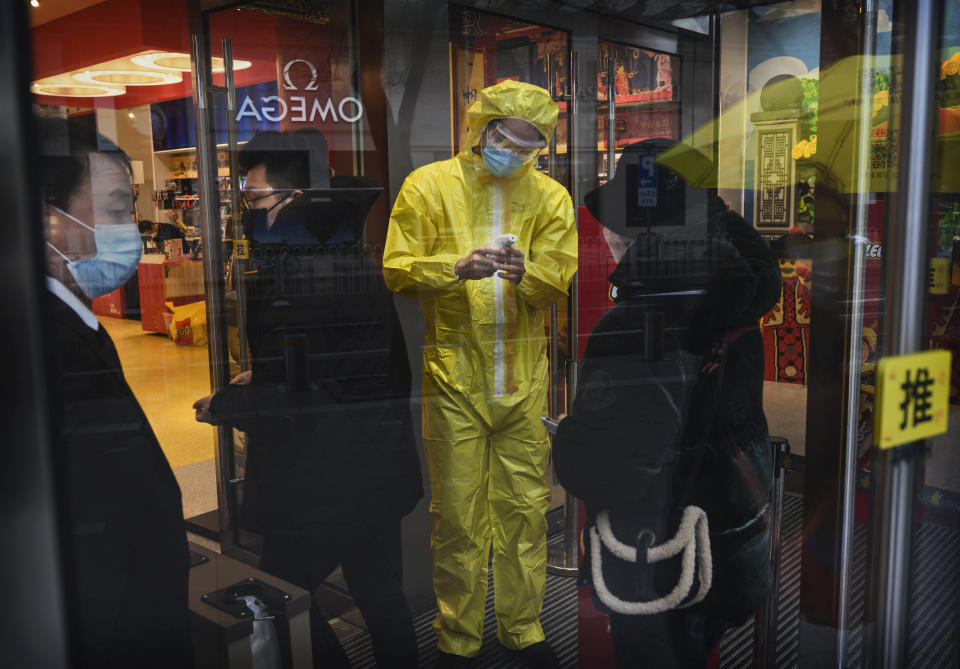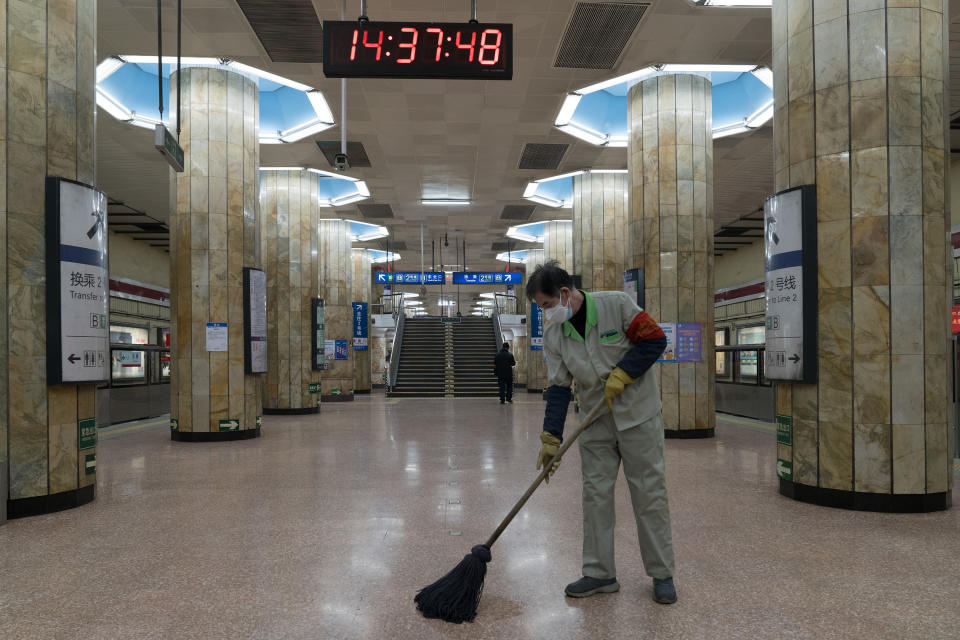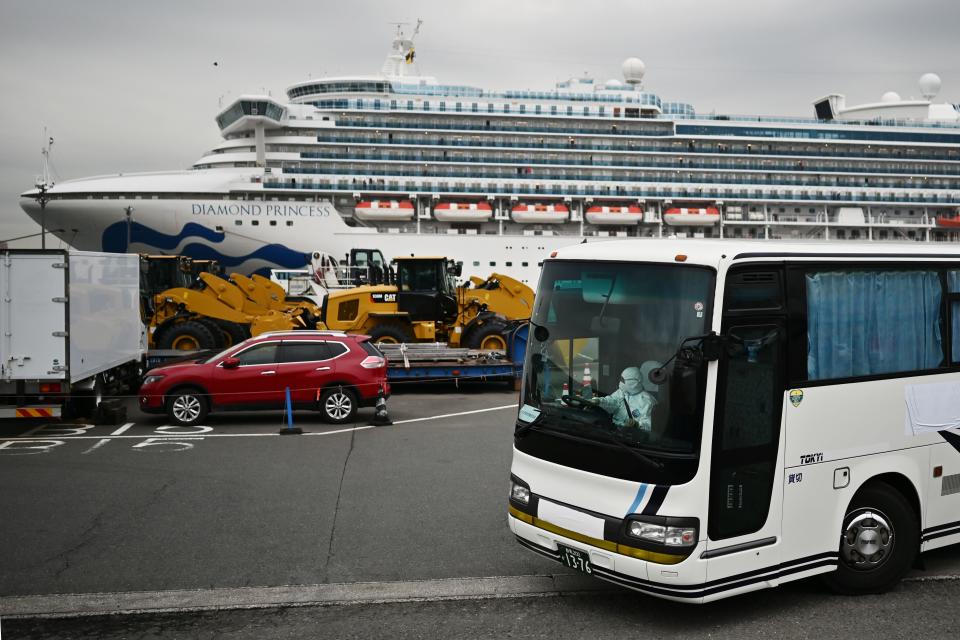Chinese cities in 'wartime' lockdown as coronavirus shows no signs of peaking
People returning to the Chinese capital Beijing from extended holidays have been ordered to undergo a 14-day self-quarantine to help prevent spread of the new coronavirus, as hard-hit Hubei province reported more than 2,400 new cases.
The official Beijing Daily newspaper said people failing to obey would be punished but it was not immediately clear how that would be enforced, or whether the restrictions would apply to non-residents of Beijing or foreigners arriving from abroad.
"From now on, all those who have returned to Beijing should stay at home or submit to group observation for 14 days after arriving," read the notice from Beijing's virus prevention working group cited by the Beijing Daily.
"Those who refuse to accept home or centralised observation and other prevention and control measures will be held accountable under law," it said.

Stricter containment measures were planned elsewhere as well. Honghu city in Hubei province imposed a "wartime" lock-down beginning on Friday, with strict management of entry into housing compounds and villages, according to an official social media account of the local police, China's CCTV reported.
Hubei officials said there were 2,420 new cases on Friday and 139 more deaths.
A top Chinese official, in an interview with Reuters, acknowledged that coronavirus was a huge challenge, but defended Beijing's management of the epidemic and lashed out at the "overreaction" of some countries.
State Councillor Wang Yi, who also serves as China's foreign minister, said China has taken decisive measures to fight the epidemic, many going beyond international health regulations and World Health Organisation (WHO) recommendations.
"Through our efforts the epidemic is overall under control," he said.

Latest figures show coronavirus cases not yet peaked
China is struggling to get the world's second largest economy going after the annual Lunar New Year holiday.
Including the latest numbers from Hubei at the epicentre of the outbreak, the total number of cases in mainland China now exceeds 66,000, with more than 1,500 deaths.
The figures show no sign that the outbreak is nearing a peak, said Adam Kamradt-Scott, an infectious diseases expert at the Centre for International Security Studies at the University of Sydney.
With 500 million people already affected by movement and travel restrictions, President Xi Jinping warned top officials last week that efforts to contain the virus had gone too far and were threatening the economy, sources told Reuters.
In Beijing and the business hub Shanghai, streets and subways remain largely deserted with many shops and restaurants empty or shut to the public.

Government employee Jin Yang, 28, made it to his Beijing office and found it "anything but normal."
Canteen lunches are banned in favour of boxed meals eaten at desks. Meetings are held online, not in person. Employees must wear masks all day and report their temperature twice a day as fever is one of the virus' main symptoms, he explained.
'Deep regret': China blasts Australia's 'overreaction' to coronavirus outbreak
'We need to go': Menu detail 'scaring customers' amid coronavirus crisis
Aussie tourists on notice after man diagnosed with coronavirus following Bali trip
Outside mainland China, there have been nearly 450 cases in some 24 countries and territories, and three deaths. Japan confirmed its first coronavirus death on Thursday. One person has died in Hong Kong and one in the Philippines.
Economists polled by Reuters said China's economic downturn would be short-lived if the outbreak was contained, but expected this quarter would show China's slowest growth rate since the global financial crisis.

The Chinese carmakers' association said auto sales in China were likely to slide more than 10 per cent in the first half of the year because of the epidemic.
Understandably, the virus is taking its toll on the $US46 billion ($A68 billion) global ocean cruise industry.
The biggest cluster of infections outside China has been on a cruise liner quarantined in a Japanese port, with 218 people on board infected and taken to hospital.
On Friday, some passengers were allowed to disembark to complete their quarantine on shore.
Perth man on cruise ship ‘has coronavirus’
A Perth man held in quarantine on board the Princess Diamond, which has been stuck at a port in Yokohama in Japan since February 4, reportedly has tested positive for the virus.
The man’s daughter Marcelly told the ABC her father Val has been diagnosed but is “feeling really good”.
“That's the strangeness of the situation, he's feeling great, my mum's feeling good," she told the ABC on Friday.
She added her mum, Iris, and dad both had symptoms of gastro which they thought may have been from the ship’s food. She said her father will be removed from the ship and taken to a hospital.

Of the 3,600 on board 218 have been diagnosed with the virus.
Australia is sending a medical expert to Japan to assist authorities deal with growing concerns for passengers on the Diamond Princess cruise ship quarantined off Yokohama because of the coronavirus.
Deputy Chief Medical Officer Paul Kelly said the infectious disease expert will join an international team to gather information about the passengers, including the 200 Australians on board.
"We will have someone on the ground as early as tomorrow morning," Professor Kelly told reporters in Canberra on Saturday.
"We will be looking at the health and welfare of that group and what might be best done with a view to getting them off the ship."

There are reports that that the US intends to get its citizens off the ship and take them home.
"We wait for our expert to be on the ground to assess what is the best option for those Australians," Prof Kelly said.
The Australian government extended the two-week travel ban from mainland China to prevent the spread of the COVID-19 for another seven days this week.
Of the 15 coronavirus cases in Australia, six have been cleared and the remaining nine are all stable.
In China, the total number infected by the virus rose to more than 66,000 on Saturday, with the number of deaths passing 1500.
A total of 1700 Chinese health workers who have been infected, with six deaths.
with Reuters and AAP
Do you have a story tip? Email: newsroomau@yahoonews.com.
You can also follow us on Facebook, Instagram and Twitter and download the Yahoo News app from the App Store or Google Play.



